Virtual Cluster Project
Across the institution there are a number of IT cluster rooms that are used for both teaching and private study. In addition to the onsite rooms, there is a remote virtual desktop service. Desktop@UCL Anywhere, the software versions on the Anywhere service vary slightly from the onsite Desktop@UCL service. During the 2020/21 academic year, onsite computers were made available remotely via the same Citrix technology as used for Anywhere.
Concerns were raised about the suitability of the computing facilities available for students initially in the Bartlett School of Architecture. Initally I was involved in discussions within the faculty about the perceived problem and need, then in wider discussions with ISD.
As a business analyst, I was tasked with understanding and developing requirements for student computing in The Bartlett Faculty of the Built Environment. With Sam I designed and conducted requirement workshops with IT staff, academics and consulted student reps. These requirements were eventually developed into a cloud computing proof of concept that is in the midst of being developed. Sam provided support in three ways:Stakeholder management – Sam was able to advise on key stakeholders to involve for different tasks (functional requirements, technical requirements, student consultation) She also highlighted which stakeholders may be challenging, as well as giving me some insight into the organisational structure.Technology insight – Sam has a great knowledge of the software tools used in the faculty as well as the physical hardware and network infrastructure available and required to support them,Faculty knowledge– Sam has a great handle on what is important in the Bartlett, both to the staff and the students. This knowledge allowed her to provide useful insights and highlighting potential risks when discussing potential solutions, She also ensured that there was focus on accessibility and equity, and showed an awareness of wider IT policies.Fraser Burgess, Business Analyst, ISD
Reflection
As a relative newcomer to the faculty I was a little concerned at times as with this project it has been important for me to ensure that the voice of the whole faculty is heard, not just that of one particular department. This therefore enabled me to talk to colleagues from across the faculty and develop a deeper understanding of their IT requirements and of some of their teaching. It also helped me develop a better understanding of the personalities involved and how best to work with those colleagues. At times I was quite forthright with my opinion as certainly in the very initial conversations within the faculty I thought that it was important to properly understand the issues and keep an open mind about potential solutions. It has been a very valuable learning opportunity.
Inspiration for Digital Engagement Activities (IDEAs) blog and cards
During the 2020/21 academic year I collaborated with colleagues from both Arena and Digital Education to further develop the Assessment for Learning ideas initially shared via the Connected Learning Essentials staff development course. The initial information provide about the ideas was very limited. There was a need to expand this and provide further guidance.
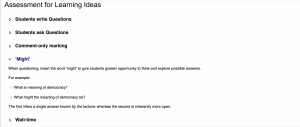
A sub-set of the AfL ideas were selected for further development. How these would be developed and shared with colleagues was discussed via series of working group meetings. We also had our own private channel in the TLA Continuity team on MS Teams to discuss the tasks. The ideas were allocated to pairs for development.
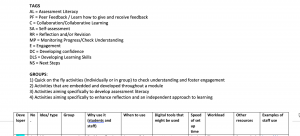
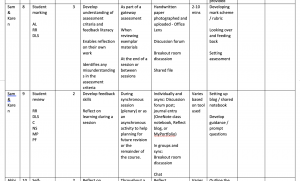
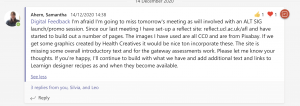
In addition to completing my own designated rows, I also reviewed those completed by others in the working group. Once the main text was finalised I worked on developing the Reflect blog, an OER, that hosts the resources and we hope will help create a community. The orginal designs for the cards created by the graphic designers had a number of accessibility concerns. I worked with colleagues in the team to re-design the cards using MS Powerpoint and make them as accessible as can be.
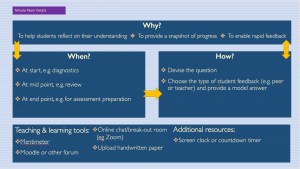
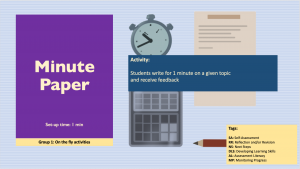
Reflection
Working in such a large team was difficult at times and it wasn’t always clear who was responsible for what or what the purpose of some activities undertaken were. At times in the working group meetings I actively sought clarification about the purpose of some activities being undertaken, I find it quite difficult when a purpose or reason is not clearly defined. Overall the combination of the expertise from both Arena and Digital Education combined well to create a set of resources that has received good feedback. Some negotiation was required with OVPESA around the blog, the central teaching and learning pages and the hosting of the content. As an open practitioner I found this initially quite difficult, but a compromise was reached. The content will be available in both places which isn’t ideal, but with the blog we are able to seek feedback, easily add crowd-sourced examples and share case studies.
Informal networks
In addition to the semi-formal insitutional networks discussed in the previous examples, I also participate in a number of informal internal and cross-institutional networks.
UCL is a member of the Bloomsbury Learning Exchange, BLE, partnership. Since joining the Digital Education space in 2016 I have been an active member of the BLE community. I regularly attend and participate in a number of group meetings including the Digital Education Team and Bloomsbury Library and E-learning Systems group. These meetings are an opportunity to learn what is happening in other insitutions, share experiences and projects, and an opportunity to explore tools and ideas. For example during 2021 a number of meetings of the Digital Education team were held in different virtual spaces such as Gather Town. This was an opportunity to experience the platform first hand, but was also facilitated by a Bloomsbury colleague who shared their experiences with the platform.
In early 2021 we realised, as FLTLs, that we needed our own network to talk to each other about our experiences and what was happening in our respective faculties. We were attending a number of meetings organised by Digital Education with various other stakeholders such as the Heads of Faculty IT, but realised we didn’t have the space to talk amongst ourselves. Although we have the same job title, the exact nature of our role and the challenges we face are different across faculties. We also all have different backgrounds. For some colleagues they have transitioned from being a learning technologist within their faculty to the Faculty LT lead role. Some like me, have never held a learning technologist role, and some colleagues have line management responsibilities. To facilitate the FLTL community I created a MS Teams team, and initially we had a monthly meeting scheduled. This has now been amended to fortnightly.
Recently I have started to attend EdTech Outlaw meetups, am an intermitted Twitter #LTHEChat participant and M25LT group meetings. All these groups enable me to learn from colleagues at different institutions with varying backgrounds and experiences.
Reflection
Since becoming a member of the Faculty Education and Student Experience team in August 2021, these informal networks have become increasingly important. I am no longer co-located with colleagues with Digital Education related roles, so at times it can feel a bit lonely being the only Digital Education person. It’s nice to be able to discuss general and institution specific issues with colleagues, who can provide alternative perspectives or advice. I am also recently started meeting with a mentor from another part of BEAMS, the organisational unit in which my faculty is located. They are a more senior colleague, but also sit in the intersection between Academic and Professional Services. I’m seeking support with regards to undestanding my role as a leader and influencing changes in practice. I really struggle to understand the impact that I have, so I was really surprised to find that I had been nominated by a fellow FLTL for, and selected as a Jisc Community Champion for 2022. I was pleasantly surprised and quite moved by the nomination.
Overall Reflections on communication and working with others
Although I was part of a the Digital Education Futures team, until Summer 2020 I had predominantly worked independently on a day-to-day basis. Both the changes to how and where I work brought about by the pandemic and my change in role have significantly changed who I communicate with, how and when.
A core component of the Faculty Learning Technology Lead role is working with Education and Connected Learning Leads across the faculty to identify and provide support and guidance. Many of whom I met for the first time upon taking up the role and via MS Teams.
Although MS Teams has been helpful, there have also been a number of learning curves. Online meetings have gotten easier but are still difficult at times especially when discussion is more free flowing. It’s harder to know when to interject. I have also found that I need to set quiet hours so that I am not disturbed by notifications out of office hours or when on leave. It has enabled me to work collaboratively with colleagues from other institutions however, I have found that I need to switch MS Teams instances to be able to fully engage in meetings or post messages in the Team when I am a Guest in Teams hosted by other institutions.